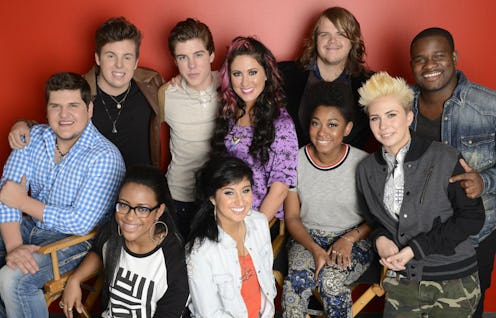
Usually, by the time we get to the Top 10 threshold on American Idol , we start to see some delineation between the folks who are sure to go home soon, the lovable middle of the roadies, and the front-runners. But for some reason, Season 13 is not so easily predictable. It's Top 10 time, and there is no clear front-runner and, believe it or not, that's actually a good thing.
What has seemed to happen is an even split between the singers who are great and the ones who need improvement. At the top of the heap are folks like Jena Irene, who continues to kill song and after song, and Alex Preston, whose Jason Mraz vibe is sleepy, but resonant with the Idol set. At the bottom are folks like CJ Spiller, who's infinitely likeable, but botched his entire performance this week and Sam Woolf, who hasn't quite managed to get command of his own destiny despite how often Jennifer Lopez manages to point out his 13-year-old girl-riddled fan club.
But even with that split between great and not-as-great singers, nothing feels final. Everything feels as if the ranks could change at any moment and that's what Idol has been missing for years: an air of unpredictability. It really could be any combination of singers in the Top 3 — even Jessica Meuse, who manages to upset the judges every week, seems to have a strong foothold among voters.
So what's changed this season? Why is it that there's no front-runner apparent? It's easy to say that the talent isn't particularly strong, but that's not necessarily the case. This season, the judges whittled down the crew to a varied base of singers, all of whom have very distinct strengths. The competition isn't centered on a group of huge voices waging the battle of the big notes. This isn't a diva-off like it was with last season's core group of front-runners. It's not even a battle of the adorable male singer-song-writers, like it had been for years before Idol changed things up. The difference appears to be the judges themselves.
While Lopez practically cries every time someone performs well, she has managed to reign in the commentary in a way that wasn't possible under Randy Jackson's cuddly rule. For the last few seasons, the good feelings, the over-used standing ovations, and the "I love you, baby" or "It wasn't for me" levels of broad strokes criticism have made the entire competition feel like a fluffy cloud just floating to the inevitable conclusion. Now, with the addition of Harry Connick, Jr. — who's made it clear he's serious about cultivating and finding the best performer possible — both Lopez's and Keith Urban's commentary has taken a step up and a more serious tone. They're harsher, but entirely more constructive. Connick's influence has brought out the analytical side of the panel because — as he did last year when he deconstructed Jackson's nonsensical advice to Kree Harrison — Connick demands that when the judges speak, they actually say something. And as any longtime Idol fan knows, that hasn't always been the case.
What that substance means is that the competition is more subtle and harder to predict. We're not sure who the judges adore and we're not sure who we need to bow down before because Lopez, Urban, and Connick aren't jumping up and down every time someone does something right. Even when they're giving someone like Irene buckets of praise for an admittedly awesome performance, they're finding areas for her to improve upon. There's always a next level to work towards. And while that means that it's tough for us to sit at home and manage our expectations of the season, that also means that from this point on, eliminations are actually going to be exciting and unpredictable. That goes doubly for the finale.
Of course, that may not bode well for the eventual winner — as we've seen, more real world success comes to those singers who are at the front of the pack like Kelly Clarkson, Carrie Underwood, and Phillip Phillips — but it's certainly good for the rest of us tuning in at home.
Image: Fox